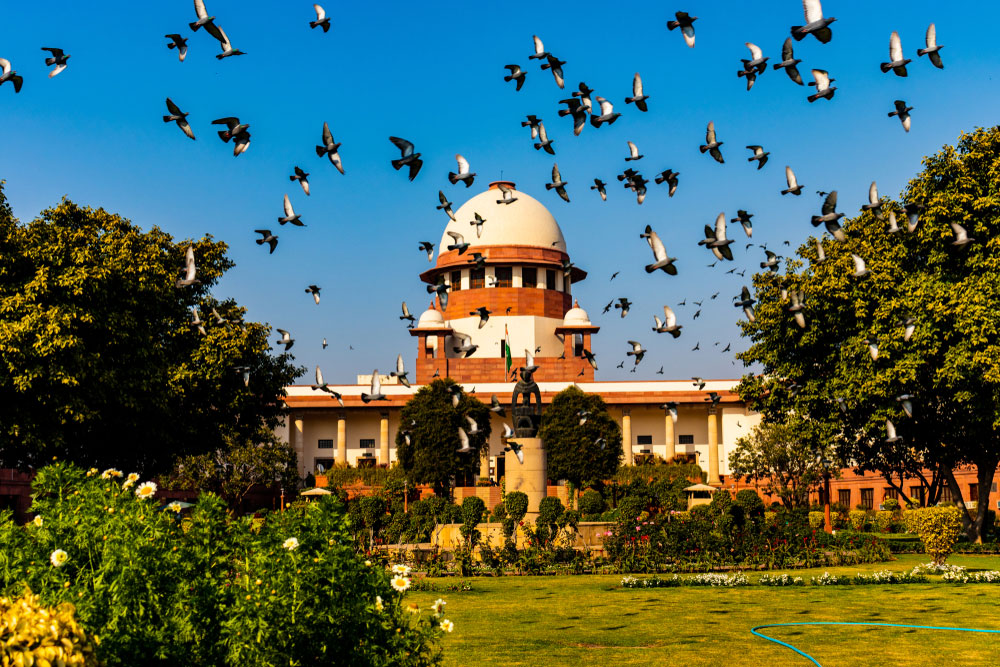The Supreme Court on Wednesday quashed the January 2000 order of the erstwhile state of Andhra Pradesh which provided 100 per cent reservation to the Scheduled Tribe candidates for the post of teachers in schools in the scheduled areas, saying it was 'arbitrary' and 'not permissible' under the Constitution.
A five-judge Constitution bench, headed by Justice Arun Mishra noted that providing 100 per cent reservation would be 'unfair' and 'unreasonable' and no law mandates that only tribal teachers can teach in the scheduled areas.
Referring to the 1992 Indra Sawhney judgement, popularly called the Mandal Commission verdict, the apex court said it was emphasised that the founding fathers never envisaged reservation of all seats and 50 per cent quota shall be the rule.
It noted that as per the 1992 verdict, extreme caution has to be exercised and special case has to be made out for exceeding 50 per cent reservation limit.
'There were no such extraordinary circumstances to provide a 100 per cent reservation in scheduled areas. It is an obnoxious idea that tribals only should teach the tribals. When there are other local residents, why they cannot teach is not understandable,' said the bench, also comprising Justices Indira Banerjee, Vineet Saran, M R Shah and Aniruddha Bose.
'The action defies logic and is arbitrary. Merit cannot be denied in toto by providing reservations,' the bench said, adding that the order providing 100 per cent reservation is 'arbitrary, illegal, impermissible, and unconstitutional'.
In its 152-page verdict, the top court said it is apparent that despite more than 72 years of attaining independence, 'we are not able to provide benefits to the bottom line, i.e., downtrodden and oppressed classes. Benefits meant to such classes are not reaching them'.
It said that those belonging to the Scheduled Castes and Scheduled Tribes were making a struggle for freedom, various rights in the country and they have also suffered discrimination and remained an 'unequal and vulnerable section of the society'.
It said the basis for providing them reservation was to provide them upliftment and to eradicate their sufferings.
'We have not been able to eradicate untouchability in the real sense so far and to provide safety and security to downtrodden class and to ensure that their rights are preserved and protected, and they equally enjoy frugal comforts of life,' it said.
The bench, while emphasising on the need to improve the system and ensure implementation of beneficial measures, observed that the right to information system has to be strengthened at the village level and people must know how money meant for development has been utilised.
'Transparency of administration is vital for the removal of corruption,' the bench said.
Dealing with the issue of quota, the top court said that rights of tribals, who are not residents of scheduled areas, shall be adversely affected if 100 per cent reservation is provided in such areas.
It also dealt with the issue related to validity of action of the Governor in issuing the notification providing 100 per cent reservation and said that, 'Every action of the legislature, whether it is Parliament or State, has to conform with the rights guaranteed in Part III of Constitution'.
'There is no power to the legislature or to the Governor to act contrary to the constitutional provisions, and they cannot enact a law in derogation to the provision contained in Part III of the Constitution,' it said.
Referring to the Presidential Order issued under Article 371-D of the Constitution, which deals with special provisions with respect to the states of Andhra Pradesh or Telangana, the bench said it intends that the candidates have to apply within the district.
'The candidates of local areas or other candidates except for Scheduled Tribes have been deprived of the opportunity of seeking public employment because of the order issued by the Governor, and they cannot apply outside the local area in view of the Presidential notification,' it said, adding, 'The Governor could not have issued the order in derogation to the Presidential Order.'
The bench also noted in its verdict that a similar order was issued by the erstwhile state of Andhra Pradesh in 1986 and the same was quashed by the state administrative tribunal.
It said that against the quashing of order, an appeal was preferred in the apex court but it was dismissed as withdrawn in the year 1998.
'After withdrawal of the appeal from this Court, it was expected of the erstwhile State of Andhra Pradesh not to resort to such illegality of providing 100 per cent reservation once again,' the bench said.
'In the peculiar circumstance, we save the appointments conditionally that the reorganised states i.e. the States of Andhra Pradesh and Telangana not to attempt a similar exercise in the future. If they do so and exceed the limit of reservation, there shall not be any saving of the appointments made, w.e.f. 1986 till date,' it said, adding, 'The cost of appeal is quantified at Rupees Five Lakhs and to be shared equally by the states of Andhra Pradesh and Telangana'.











